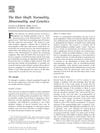 April 2017 in “Journal of Investigative Dermatology”
April 2017 in “Journal of Investigative Dermatology” The PON1 192R gene variant is linked to a higher risk of psoriasis and heart disease in Western Mexico.
 April 2017 in “Journal of Investigative Dermatology”
April 2017 in “Journal of Investigative Dermatology” Found new possible treatments for hair loss.
 April 2017 in “Journal of Investigative Dermatology”
April 2017 in “Journal of Investigative Dermatology” Eating a lot of fat increases PKCβ and inflammation in skin fat cells, which affects skin and hair health.
 April 2017 in “Journal of Investigative Dermatology”
April 2017 in “Journal of Investigative Dermatology” Researchers created a skin graft that senses blood glucose and could treat diabetes using CRISPR-edited stem cells.
 3 citations,
August 2010 in “Anais brasileiros de dermatologia/Anais Brasileiros de Dermatologia”
3 citations,
August 2010 in “Anais brasileiros de dermatologia/Anais Brasileiros de Dermatologia” A rare genetic disease caused severe, worsening hair loss from early childhood with poor treatment results.
 2 citations,
February 2019 in “bioRxiv (Cold Spring Harbor Laboratory)”
2 citations,
February 2019 in “bioRxiv (Cold Spring Harbor Laboratory)” The Asiatic lion has very low genetic diversity and unique genetic traits, highlighting the need for its conservation.
 89 citations,
August 2008 in “Human genetics”
89 citations,
August 2008 in “Human genetics” The EDAR gene greatly affects hair thickness in Asian populations.
 17 citations,
November 2012 in “Journal of Investigative Dermatology”
17 citations,
November 2012 in “Journal of Investigative Dermatology” The document concludes that over 500 genes are linked to hair disorders and this knowledge is important for creating new treatments.
 November 2020 in “Journal of The American Academy of Dermatology”
November 2020 in “Journal of The American Academy of Dermatology” The conclusion is that many small genetic variations influence claw disorders in cows, and using genomic selection could help reduce these disorders.
August 2024 in “Cosmetics” Personalized treatments for hair loss are becoming more effective by using genetic information.
 124 citations,
June 2002 in “Best Practice & Research Clinical Endocrinology & Metabolism”
124 citations,
June 2002 in “Best Practice & Research Clinical Endocrinology & Metabolism” Polycystic Ovary Syndrome likely starts in childhood and may be genetic and influenced by early hormone exposure.
 100 citations,
April 2010 in “Expert Opinion on Pharmacotherapy”
100 citations,
April 2010 in “Expert Opinion on Pharmacotherapy” Hair loss in men treated best with early medication or transplant, new treatments researched.
 31 citations,
June 2011 in “Movement Disorders”
31 citations,
June 2011 in “Movement Disorders” The document describes a woman with familial Parkinson's disease due to a genetic mutation, showing severe symptoms and poor response to treatment, and suggests finasteride may help reduce symptoms in Tourette syndrome.
 991 citations,
January 2011 in “Nature Reviews Endocrinology”
991 citations,
January 2011 in “Nature Reviews Endocrinology” The document concludes that PCOS is a complex disorder caused by both genetic and environmental factors, affecting women's health in various ways, and requires personalized treatment.
 28 citations,
May 2017 in “Molecular ecology”
28 citations,
May 2017 in “Molecular ecology” Researchers found genes that control hair color and growth change before the visible coat color changes in snowshoe hares.
10 citations,
September 2022 in “Animals” Certain genes affect udder shape in Holstein cows, important for health and milk production.
 7 citations,
November 2013 in “Pediatric and Developmental Pathology”
7 citations,
November 2013 in “Pediatric and Developmental Pathology” Over half of the children had abnormal hair under a microscope, with many having genetic hair conditions.
 2 citations,
May 2023 in “Journal of Advanced Research”
2 citations,
May 2023 in “Journal of Advanced Research” Two mutations in KRT74 and EDAR genes cause sheep to have finer wool.
 49 citations,
November 2019 in “Egyptian Journal of Medical Human Genetics”
49 citations,
November 2019 in “Egyptian Journal of Medical Human Genetics” Certain gene variants may contribute to high androgen levels in women with polycystic ovary syndrome.
 76 citations,
April 2005 in “Cancer Epidemiology, Biomarkers & Prevention”
76 citations,
April 2005 in “Cancer Epidemiology, Biomarkers & Prevention” E211 G>A gene linked to lower risk of severe prostate cancer and hair loss.
 9 citations,
February 2022 in “Nature communications”
9 citations,
February 2022 in “Nature communications” Rare changes in the KRT82 gene are linked to a higher risk of Alopecia Areata.
 June 2024 in “International Journal of Nanomedicine”
June 2024 in “International Journal of Nanomedicine” CRISPR/Cas9 has improved precision and control but still faces clinical challenges.
 47 citations,
December 2019 in “Frontiers in immunology”
47 citations,
December 2019 in “Frontiers in immunology” A new mutation in the STING protein causes a range of symptoms and its severity may be affected by other genetic variations; treatment with a specific inhibitor showed improvement in one patient.
 11 citations,
March 2001 in “Clinics in Dermatology”
11 citations,
March 2001 in “Clinics in Dermatology” Hair microscopy is useful for diagnosing hair disorders, but clear definitions are needed for accurate genetic analysis.
 July 2020 in “Research Square (Research Square)”
July 2020 in “Research Square (Research Square)” Selective breeding can enhance immunity in dairy cattle.
 26 citations,
November 2010 in “Experimental Dermatology”
26 citations,
November 2010 in “Experimental Dermatology” Two gene areas linked to male pattern baldness found, more research needed.
 24 citations,
January 2000 in “Dermatology”
24 citations,
January 2000 in “Dermatology” Gene linked to common hair loss found, may lead to new treatments.
717 citations,
June 2010 in “Nature” Alopecia areata involves both innate and adaptive immunity, with specific genes linked to the disease.
 4 citations,
November 2017 in “Scientific Reports”
4 citations,
November 2017 in “Scientific Reports” The research provides a gene-based framework for hair biology, highlighting the Hippo pathway's importance and suggesting links between hair disorders, cancer pathways, and the immune system.
 November 2009 in “Medical & surgical dermatology”
November 2009 in “Medical & surgical dermatology” The document concludes that Borrelia afzelii causes a skin condition in France, a gene is linked to hair loss in Caucasian women, and various genetic mutations affect skin diseases.



























